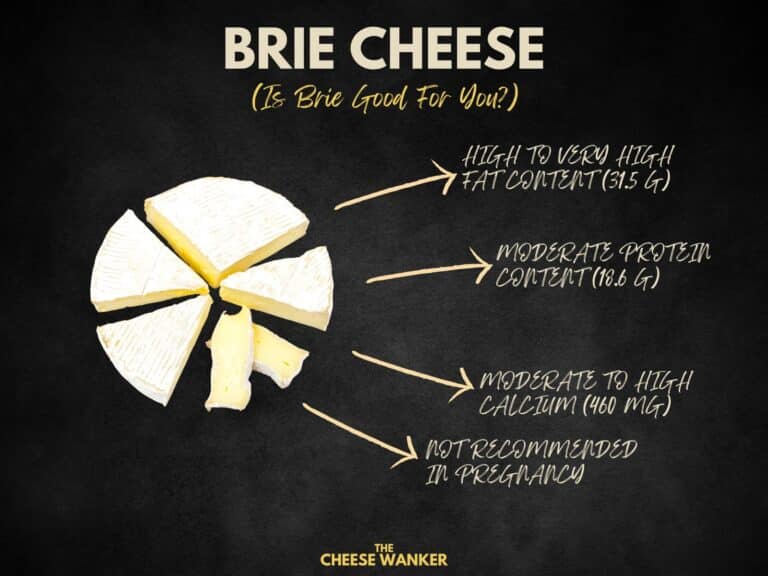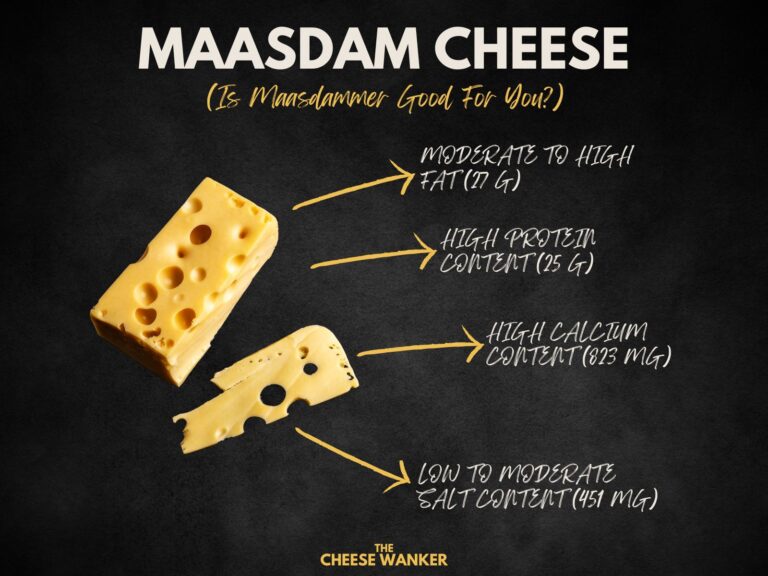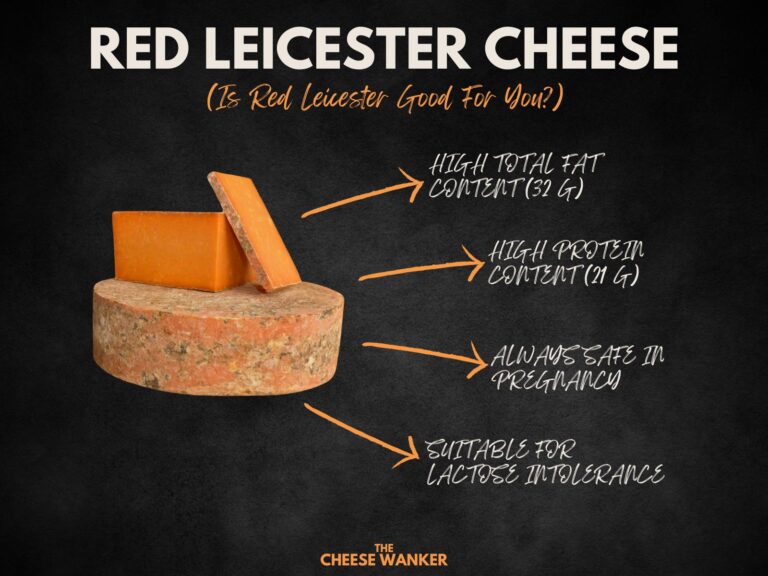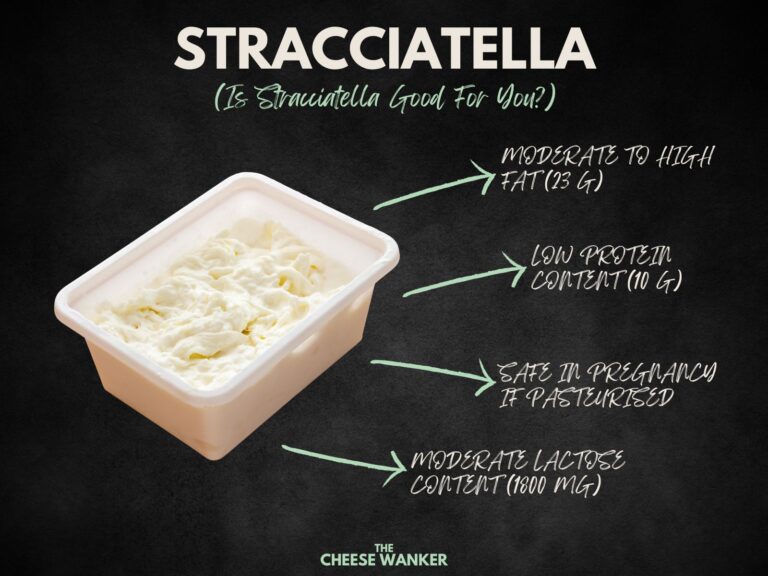Derived from southern Italy, Caciocavallo cheese has transcended regional boundaries and become a global delight. In this blog post, we delve into the nutrition facts of Caciocavallo, analysing its macronutrients profile, safety during pregnancy, salt content and calcium benefits. Read on to find out whether Caciocavallo is good for you.
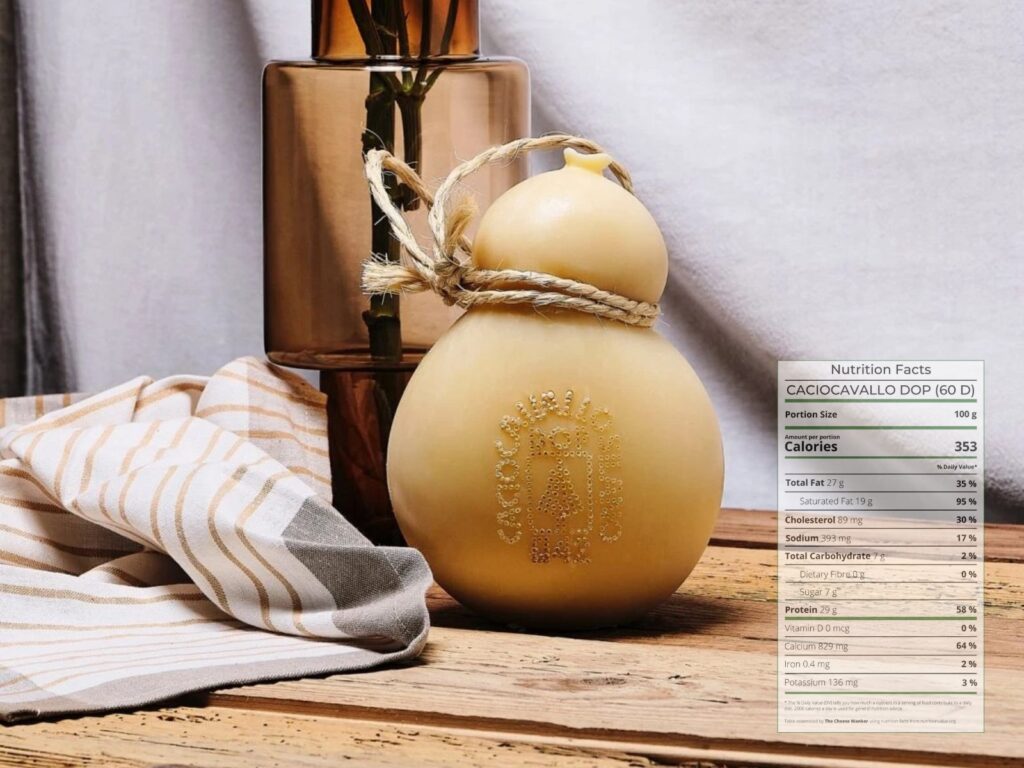
SEE ALSO: Nutrition facts for popular world cheeses in The Cheese Wanker’s index →
What is Caciocavallo?
Originating from the picturesque regions of southern Italy, Caciocavallo is a culinary treasure steeped in history and tradition. This aged pasta filata cheese is believed to have ancient origins, dating back to the 14th century.
Actually, the name ‘Caciocavallo’ itself is derived from the Italian words “cacio“, meaning cheese, and “cavallo“, meaning horse. The name originates from the traditional method of suspending the cheese in pairs on wooden boards, resembling saddlebags draped over a horse’s back.
This age-old technique allows the cheese to develop its distinctive teardrop shape, creating an iconic visual identity.
Nutrition fact sheet
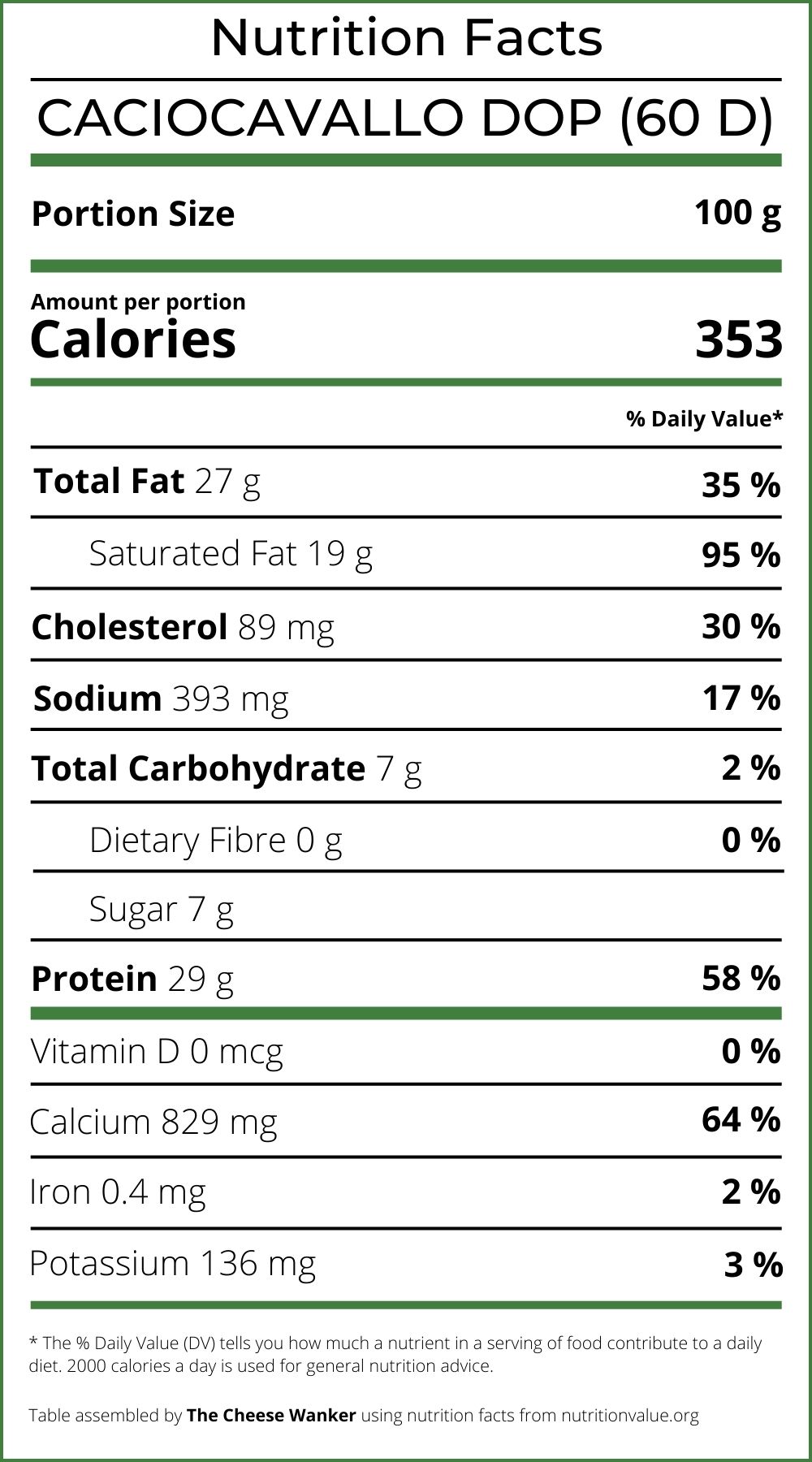
Country of origin
Italy
Type of Cheese
Pasta Filata Cheese
Milk
Cow
Examples
Caciocavallo Silano, Caciocavallo Podolico, Smoked Caciocavallo, Caciocavallo Semi-Piccante, Caciocavallo Abbruzese, Caciocavallo Affinato in Grotta
Benefits
Very Low Lactose Content, High Protein Content, Safe in Pregnancy (Pasteurised), Very High Calcium Content
Considerations
Milk Protein Intolerance, Moderate to High Fat Content, Moderate to High Salt Content
Nutritional review for Caciocavallo
Eating healthy plays a pivotal role in maintaining overall well-being and preventing chronic diseases. A balanced and nutritious diet provides our bodies with essential vitamins, minerals, and macronutrients, fuelling optimal physical and cognitive function.
With this in mind, let’s have a look at some of the key nutrition facts for Caciocavallo.
Lactose Intolerance
For lactose-intolerant people, enjoying dairy products often involves navigating tolerance levels and finding suitable options.
In the case of Caciocavallo, the ageing process significantly reduces its lactose content, making it potentially accessible to some lactose-intolerant cheese lovers. As the cheese matures, bacteria break down lactose into simpler sugars and lactic acid, resulting in substantially lower lactose levels.
However, individual responses to lactose can vary widely. Some lactose-intolerant people may tolerate small amounts of lactose, while others might be more sensitive. Therefore, it’s essential for individuals to assess their own tolerance levels cautiously when considering Caciocavallo cheese.
Fat Content
Navigating the fat content in Caciocavallo requires a nuanced perspective, acknowledging the diversity of fats present in this dairy delight. With 27 g of fat per 100 g, Caciocavallo contains a mix of saturated, monounsaturated and polyunsaturated fats.
While excessive saturated fats can pose health risks, the presence of monounsaturated and polyunsaturated fats in Caciocavallo contributes to a more balanced fat profile. These healthier fats are associated with various health benefits, making Caciocavallo a reasonable choice for individuals mindful of their fat intake.
As with any food, it’s essential to consider individual dietary needs and health conditions. Consulting with healthcare providers or nutritionists can provide tailored guidance, ensuring individuals can enjoy the unique flavours of Caciocavallo while maintaining a health-conscious approach to their diet.
You can learn more about the different types of fat in cheese and which cheeses have the lowest fat content here.
Cholesterol Content
Appraising the cholesterol content in Caciocavallo is a matter of dispelling misconceptions and appreciating the role of dietary cholesterol in overall health. With 89 mg of cholesterol per 100 g, Caciocavallo cheese contains a moderate amount of this lipid.
Contrary to popular belief, dietary cholesterol, including that found in Caciocavallo, does not necessarily translate to higher blood cholesterol levels for most people. The body regulates cholesterol production based on dietary intake, making moderate consumption of Caciocavallo unlikely to significantly impact blood cholesterol levels adversely.
It’s essential to note that individual responses to dietary cholesterol can vary. While some individuals may be sensitive to cholesterol intake, others may not experience significant effects.
For those concerned about cholesterol levels, it’s advisable to monitor overall dietary choices, including fats and cholesterol, as part of a holistic approach to heart health.
You can learn more about the impact of dietary cholesterol on blood cholesterol levels in our dedicated post here.
Protein Content
The protein content in Caciocavallo cheese, at 29 g per 100 g, underscores its status as a nutritional powerhouse. The proteins in this cheese are of high biological value, providing essential amino acids vital for various bodily functions.
Proteins play a crucial role in muscle repair, immune system maintenance and enzyme production, highlighting their significance in a balanced diet. Caciocavallo, with its significant protein composition, offers an excellent source of this essential nutrient, making it a valuable addition to diverse diets.
Proteins in Caciocavallo are not only abundant but also diverse, contributing to the body’s overall protein requirements. Moreover, the presence of essential amino acids in this cheese ensures that individuals consuming it benefit from a complete protein source, vital for overall health.
Furthermore, incorporating Caciocavallo into meals can be particularly advantageous for individuals following vegetarian or plant-based diets. This cheese provides an alternative source of essential amino acids traditionally found in animal products.
Want to find out which cheeses have the highest protein content? Click here for our blog post covering cheeses with the highest protein content.
Safety in Pregnancy
The safety of consuming Caciocavallo during pregnancy hinges on specific factors that expectant mothers must consider. Pasteurised Caciocavallo cheese generally poses minimal risks during pregnancy.
Pasteurisation involves heating the cheese to kill harmful bacteria, ensuring a safer product for consumption, especially for pregnant women.
Another essential aspect ensuring safety is the cheese’s low moisture content. Caciocavallo, having low moisture, creates an inhospitable environment for harmful bacteria, further enhancing its safety profile for expectant mothers.
Expectant mothers should consult healthcare providers to receive personalised guidance on including Caciocavallo in their diets safely. While pasteurised and low-moisture Caciocavallo cheese can be a part of a balanced pregnancy diet, individual health considerations and medical advice should always be prioritised.
Hence, if you’re unsure of what you can eat during pregnancy, you should consult your healthcare professional to get a personalised plan. You can read more about which cheeses you can eat when you’re pregnant by clicking here.
Salt Content
Understanding the salt content in Caciocavallo cheese is vital for maintaining a balanced diet. Caciocavallo cheese contains 393 mg of salt, contributing to its characteristic savoury flavour.
While salt is a natural preservative and taste enhancer, it’s crucial to consume it in moderation, especially for individuals prone to hypertension, heart disease or kidney problems. In fact, excessive salt intake can elevate blood pressure, increasing the risk of heart-related issues.
Caciocavallo’s saltiness stems from the salt added during the cheesemaking process. It’s important for consumers to be mindful of their overall salt intake, considering both processed and natural sources of salt in their diet.
While enjoying Caciocavallo, people should be aware of their daily salt limits, ensuring they balance it with other low-sodium food choices to maintain optimal health. Moderation and awareness are key when indulging in this delightful cheese, allowing individuals to relish its taste while safeguarding their well-being.
You can read more about why salt is important in cheesemaking in our comprehensive post here.
Calcium Content
With its substantial calcium content of 829 mg per 100 g, Caciocavallo offers a remarkable source of this essential mineral.
For individuals who may have dietary restrictions or are lactose intolerant, calcium from cheese like Caciocavallo can be a valuable addition to their diets, contributing to their calcium requirements.
Calcium ensures the strength and density of bones and teeth. It is particularly important during pregnancy, childhood and as individuals age, as these life stages involve increased demands for calcium.
Incorporating Caciocavallo into one’s diet can be a practical way to obtain this vital mineral, contributing to overall bone health and well-being.
Learn more about this mineral in our complete guide to calcium content in cheese in this post here.
Conclusion
In the intricate tapestry of gourmet cheese, Caciocavallo stands as a testament to both tradition and nutrition.
As we journeyed through its nutritional profile, exploring aspects from lactose tolerance to calcium benefits, it becomes clear that Caciocavallo is more than just a flavourful indulgence. It’s a treasure trove of essential nutrients, offering a balance of proteins, fats, and minerals, making it a valuable addition to diverse diets.
Understanding the intricacies of Caciocavallo’s nutrition empowers us to make informed choices, embracing its taste while being mindful of our health. Whether relishing its creamy texture, appreciating its protein richness, or benefiting from its calcium stores, this cheese embodies the harmonious blend of taste and well-being.
In every bite, we celebrate not just a cheese but a journey into the heart of wholesome indulgence, reminding us that the joy of food lies not just in its taste but in the wisdom of balanced nutrition.
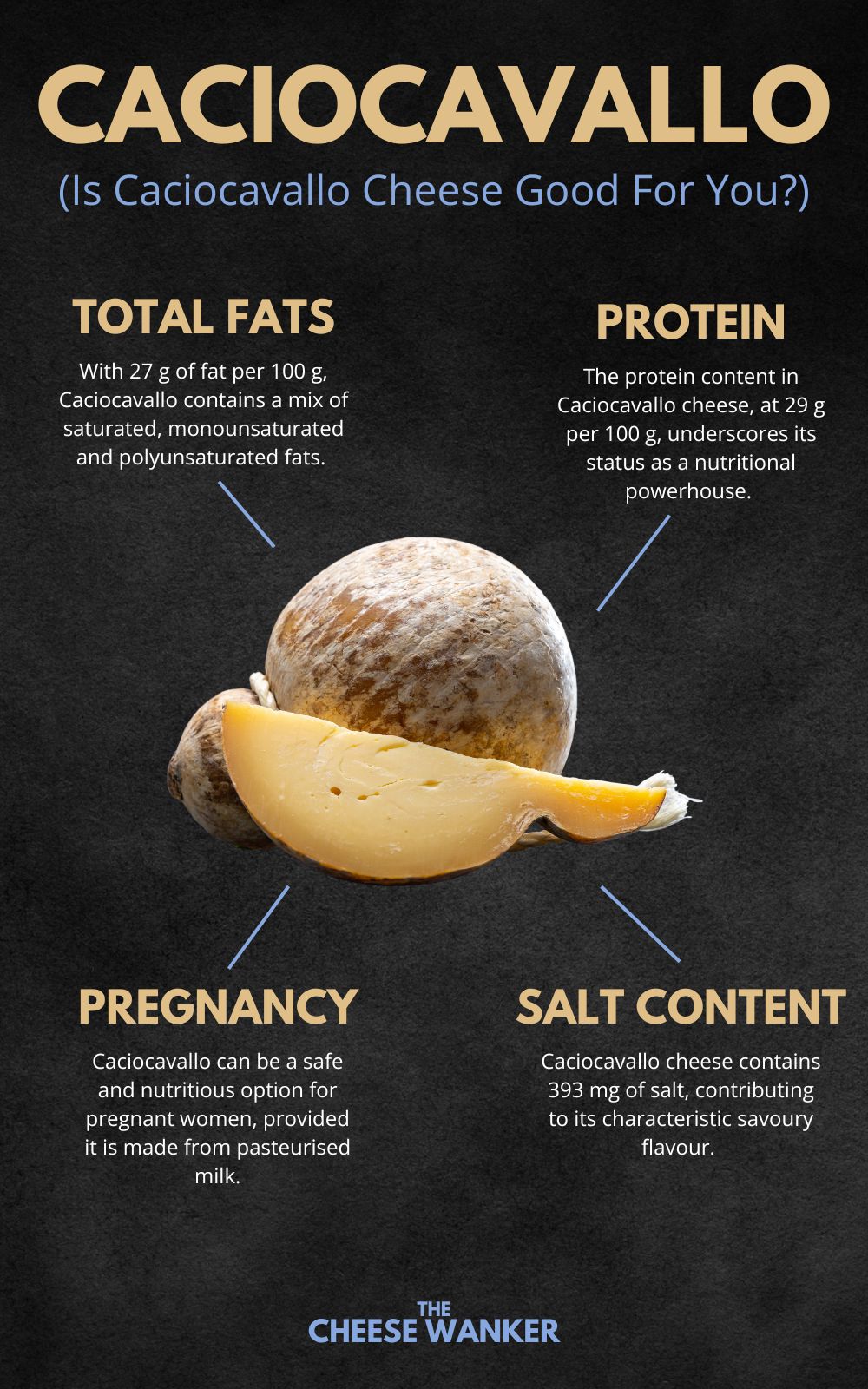
References
All the advice relating to what cheeses you can eat during pregnancy in this article is based on the recommendations by health authorities in Australia, the UK and the USA. If you are unsure about what you can or cannot eat, please consult your doctor.
Australia – FSANZ
United Kingdom – NHS
United Sates of America – FDA
